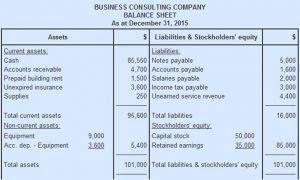What Is Gaap Generally Accepted Accounting Principles?
Content

Financial statements using the cash method of accounting are still valid, but if they are prepared by a CPA, the CPA cannot claim that the statements are consistent with the GAAP bookkeeping standards. GAAP ensures that financial reporting is transparent and standardized. An accountant or analyst versed in GAAP principles should be able to read and understand the accounting and financial reporting methods for any company following GAAP standards. In the aftermath of the Great Depression, it was believed that this financial upheaval was caused, in part, by haphazard and even fraudulent financial reporting by publicly traded businesses.
- Each country’s own version of the FASB, such as the Canadian Institute of Chartered Accountants , creates these rules.
- In an effort to move towards unification, the FASB aids in the development of IFRS.
- The U.S. Securities and Exchange Commission has said that it will gradually switch from US GAAP to the International Financial Reporting Standards .
- These components create consistent accounting and reporting standards, which provide prospective and existing investors with reliable methods of evaluating an organization’s financial standing.
- Then they required that all publicly traded companies use these to ensure forthright financial reporting that had the additional benefit of allowing apples-to-apples comparisons between businesses.
- The focus of this principle is that there should be a consistency in the procedures used in financial reporting.
- Many groups rely on government financial statements, including constituents and lawmakers.
The 1929 stock market crash was a precursor to one of the hardest economic times that has ever been known, the Great Depression. The first accounting principles in the U.S. were developed in 1939, and since then several governing bodies have been responsible for their maintenance. By 2008, there were thousands of unorganized GAAP principles that needed to be followed. So the FASB undertook a major project of organizing and codifying them into 90 categories. As an international alternative to GAAP, IFRS is the accounting standard used in more than 110 countries while GAAP remains the benchmark for accounting practices in the United States. This means financial reporting should be made without any expectation for compensation.
Faf, Financial Accounting Foundation
The financial data representation should be done “as it is” and not based on any speculation. If the standards are changed or updates, the accountants are expected to fully disclose and explain the reasons behind the changes. This accounting principle refers to the intent of a business to carry on its operations and commitments into the foreseeable future and not to liquidate the business. The best way to understand the GAAP requirements is to look at the ten principles of accounting. The GAAP has gradually evolved, based on established concepts and standards, as well as on best practices that have come to be commonly accepted across different industries.
Gilat Reports Strong Fourth Quarter and Full Year 2021 Results – GlobeNewswire
Gilat Reports Strong Fourth Quarter and Full Year 2021 Results.
Posted: Tue, 15 Feb 2022 12:18:40 GMT [source]
Two boards are responsible for setting GAAP accounting standards, namely the Financial Accounting Standards Board and the Government Accounting Standards Board . The GASB has jurisdiction over financial reporting by government entities, and the FASB is responsible for establishing rules for the private sector. Relevant information in accounting is information that has an impact on the financial status of a company.
Precedence Of Gaap
Others are strategic and can affect the company’s performance and profits for years. Gross profit is one of several key profitability metrics that help companies evaluate their what is gaap financial health. It is necessary to determine gross profit before you can calculate other important figures such as net profit, EBITDA, and the company’s bottom line.
GAAP to the International Financial Reporting Standards , the latter differ considerably from GAAP and progress has been slow and uncertain. More recently, the SEC has acknowledged that there is no longer a push to move more U.S companies to IFRS so the two sets of standards will “continue to coexist” for the foreseeable future. Some countries and multinational companies would like to see the differences between GAAP and IFRS – the International Financial Reporting Standards – eliminated. Fusing the two would ease comparisons between companies based in different regions. Advocates of the merger say it would also simplify management, investment, transparency and accountant training.
Governmental Accounting Standards Board
I am reading your book, the Accounting Quickstart Guide, & I think it’s better than other books I’m reading. Yes, this subject can be dry, but I prefer your methodical teaching, peppered with common sense, to the casual-easy going in tone of other books. Yours has been more thoroughly informative than they, in my opinion. GAAP-compliant accountants are committed to accuracy and impartiality. One of the reasons the GAAP framework exists at all is to encourage and mandate strong ethics and professionalism on the part of participants.
That’s not required. What’s required is a certification to state that not only is the documentation correct, but the financial records kept meet GAAP standards. There’s no experience necessary to go to a warehouse and confirm it has inventory.
— Dean (@deanandersonnyc) February 7, 2022
The Generally Accepted Accounting Principles, or GAAP, are a specific set of guidelines created by the Financial Accounting Standards Board aimed at helping publicly traded companies create financial statements. Explore the history of GAAP and learn about the accounting factors that influence GAAP. Within the United States, it provides a set of rules and standards for accounting practices, including the creation of standard financial statements like the balance sheet and income statement. Generally Accepted Accounting Principles make financial reporting standardized and transparent, using commonly accepted terms, practices, and procedures.
Limitations Of Using Gaap
If you find discrepancies with your credit score or information from your credit report, please contact TransUnion® directly. According to the cost constraint principle, the cost of reporting financial information should be less than the benefit derived from that financial information. In other words, providing financial information in accordance with GAAP should not cause an undue financial burden. Whenever a generally accepted accounting principle makes it into the news, it is almost without fail the full disclosure principle. Or, more specifically, it’s because of failure to follow the full disclosure principle.

However, this doesn’t mean a business is exempt from complying with GAAP simply because of the cost involved. This principle typically applies to a small number of companies and only if the financial information being provided is truly inconsequential in relation to the cost.
What Is Gaap?
Different but equally valid accounting methods are sometimes available. Companies should always use the same methods across reporting periods as much as possible.
Today, the SEC relies on the Financial Accounting Foundation , an independent professional accounting group, to develop standards. The Financial Accounting Standards Board and the Governmental Accounting Standards Board , two standards-setting organizations within the FAF, developed GAAP, and work to oversee and improve it. The FASB offers a series of templatesfor companies to follow to ensure that they are following correct reporting guidelines. Keep in mind, though, that GAAP grants companies a fair amount of leeway in how they recognize expenses and revenue. GAAP is the abbreviation of Generally Accepted Accounting Principles. GAAP is not necessarily a collection of rules and guidelines, though GAAP uses those.

My mission is to ensure that information on financial statements is relevant, reliable, comparable, and consistent. A third important relation of mine is the International Accounting Standards Board . The IASB is the body that sets the global standards for international accounting. The members of this board are from diverse nationalities, but each has the common interest of setting globally accepted accounting principles. The United States Securities and Exchange Commission adopts these standards and accountants are mandated to follow these principles when arranging or collating financial statements. United States Securities and Exchange Commission The SEC was created as a result of the Great Depression. The SEC encouraged the establishment of private standard-setting bodies through the AICPA and later the FASB, believing that the private sector had the proper knowledge, resources, and talents.
With the ability to portray a company’s fiscal standing in a favorable light, investors could be easily misled. As corporations increasingly need to navigate global markets and conduct operations worldwide, international standards are becoming increasingly popular at the expense of GAAP, even in the U.S. Almost all S&P 500 companies report at least one non-GAAP measure of earnings as of 2019. Due to the progress achieved in this partnership, the SEC, in 2007, removed the requirement for non-U.S. Companies registered in America to reconcile their financial reports with GAAP if their accounts already complied with IFRS. David Kindness is a Certified Public Accountant and an expert in the fields of financial accounting, corporate and individual tax planning and preparation, and investing and retirement planning. David has helped thousands of clients improve their accounting and financial systems, create budgets, and minimize their taxes.
In some cases, accountants are able to record financial transactions in more than one way. The method that shows a lower amount of net income or assets is the one that accountants will use. Accountants also will not report potential gains in a company’s financial statements. Any potential losses will be included so that investors will be aware of impending negative impacts.
- This means that accountants should not speculate or forecast financial figures on external financial statements, though you and your accounting team can develop internal budget forecasts for this purpose.
- While GAAP accounting strives to alleviate incidents of inaccurate reporting, it is by no means comprehensive.
- Companies in more than 100 countries (and more than two-thirds of G20 nations) follow standards set by the International Financial Reporting Standards Foundation, which are broadly similar to GAAP.
- Generally Accepted Accounting Principles are the standard instructions for financial accounting– also known as standard accounting practice, or accounting standards.
- The objectivity principle is, in part, the reason many companies will have an independently audited set of financial statements produced on a routine basis.
- GAAP helps govern the world of accounting according to general rules and guidelines.
While the GAAP rules are intended to be flexible to fit the needs of a variety of business models, ambiguity has led to misinterpretation regarding the spirit of the rules. Even companies that generally adhere to GAAP may still put out other, non-GAAP-compliant financial statements. Even if a company’s financial statement looks rosy, that doesn’t necessarily mean it’s a good investment for you. It’s up to you as an investor to know what information you value the most and scrutinize all financial statements with care. The primary difference between the two is in the overarching philosophy. While GAAP is more rules-based, providing specific instructions for different scenarios, IFRS is more rooted in principles.
Limitations Of Gaap
GAAP is currently defined by the Financial Accounting Standards Board and is primarily used by U.S. businesses. International Financial Reporting Standards, or IFRS, is the accounting framework used outside the U.S. GAAP has more rules than IFRS and, not surprisingly, is more difficult to understand. Still, it is considered to be a more comprehensive accounting structure.
This is also a GAAP principle that states that an accountant must present fact-based data at all times and not present speculated data. This means that an accountant must be accurate while depicting the financial status of a company in a financial report. Businesses that conduct some of their operation in foreign currencies need to convert the amount to the accepted currency and disclose this. Practice Bulletins, which indicate the AcSEC’s views on narrow financial reporting issues not considered by the FASB or the GASB. As of 2010, the convergence project was underway with the FASB meeting routinely with the IASB. The SEC expressed their aim to fully adopt International Financial Reporting Standards in the U.S. by 2014. Although GAAP is only mandatory for publicly traded and regulated companies, it is strongly encouraged for all companies.
